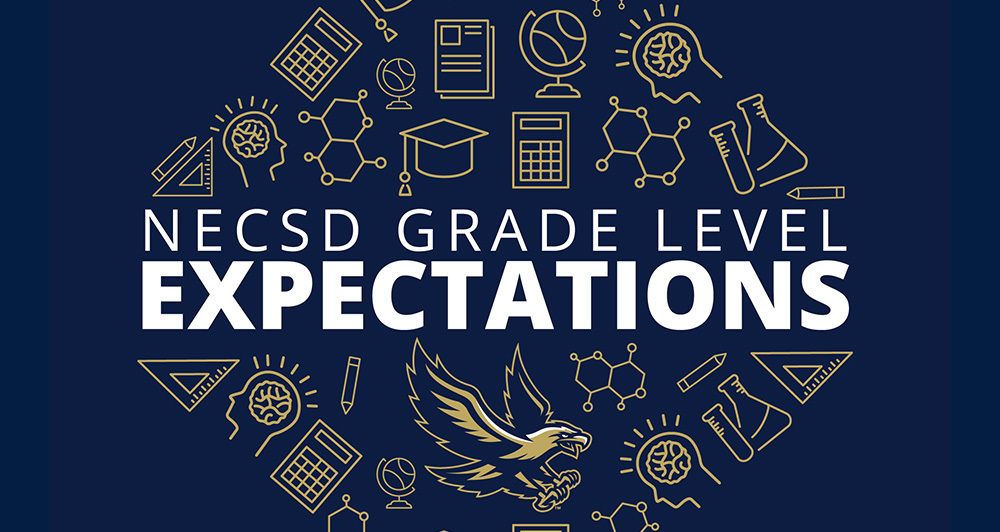English Language Arts Department
NECSD English Language Arts K-12 Program
In the Newburgh Enlarged City School District, we use a cognitive apprenticeship approach to literacy instruction. Our literacy program is designed using a comprehensive literacy structure to deliver instruction in reading and writing. A comprehensive literacy structure is based on 5 essential components of literacy instruction identified by the 2000 National Reading Panel (NRP) Report and extensive literacy research conducted over the last 20 years.
The 2000 NRP Report identified the following components of a literacy program:
- Phonemic Awareness- ability to identify and manipulate individual sounds in spoken words
- Phonics- instruction on the relationship of letters in written language with the sounds of spoken language to help students read written words
- Fluency- reading with speed, accuracy, and expression
- Vocabulary- the knowledge of words, including structure, use, and meaning
- Text Comprehension- the ability to make meaning using specific skills, strategies, vocabulary, background knowledge, and verbal reasoning skills (understand and use reason to make meaning of words)

Further research in literacy instruction expanded the components of an effective literacy program to include the following additional components
- Oral language- use spoken language to express knowledge, ideas, and emotions
- Spelling- forming words using the letters associated with the sounds
- Syntax- the way words are put together to create meaning
- Written Expression- complex process which includes planning, drafting, editing, revising, and publishing written language at the word, sentence, and text level

Grade Level Expectations
This “Grade Level Expectations” program summarizes the skills each scholar should be able to demonstrate by the end of school year, as identified by the New York State Next Generation Learning Standards (adopted 2017). These standards are the framework which guides the development of the NECSD curriculum.

ELA K-12 Curriculum Overview
100 Book Challenge
All K-8 scholars will participate in the 100 Book Challenge this year. The 100 Book Challenge is an independent reading framework designed to encourage your child to become an avid, life-long reader proficient in reading skills. More information about the 100 Book Challenge.
Home Update
You will receive a Home Update from your child’s teacher with each progress report and report card. The home update provides information about your child’s strengths as a reader & suggestions for helping them improve their reading skills at home. See sample
Units of Study
All K-12 scholars learn and practice literacy skills through thematic units of study. Themes include science, social studies, and literary topics. Access Units of Study

NYS Regents Review Resources
Regents Review Youtube Videos- This collection of videos are designed to review the format of each component of the exam.
ESL-BITS (Literature): This link will connect you with audio recordings of short stories, novels, and novellas. This is a great resource for ELLs who need to practice their listening and reading comprehension skills.
ESL-BITS (Informational): This link will connect you with audio recordings of articles, interviews, speeches, and opinions. This is a great resource for ELLs who need to practice their listening and reading comprehension skills.
Regents Exams in English Language Arts- This link will connect you to old NYS Regents exams previously administered. It can be used to practice Regents style questions. Answers are available to check your progress.

The newly revised NYS Next Generation English Language Arts Learning Standards were adopted by NYS in 2017. The standards outline the intended learning students need to accomplish by the end of the school year for each grade level. NECSD uses the NYS Next generation Learning Standards to design instruction for K-12 students in English Language Arts. For more information on the implementation of the NYS Next Generation English Language Arts Standards, please visit the links below.
Parent’s Guide to the NYS Next Learning Standards
This resource provides the following:
- A description of the instructional cycle and the role of learning standards in the cycle
- An FAQ for the Next Generation Learning Standards
- Links and resources to support classroom learning at home
NYS Next Generations English Language Arts Standards
This resource provides information about the standards in each grade level.

All NECSD K-8 students are screened three times per year using the iReady Diagnostic Reading Assessment to ensure they are on track for proficiency in phonemic awareness, phonics, vocabulary, and text comprehension.
Additional diagnostic measures are used to monitor student proficiency of literacy skills in K-12 classrooms. These include the following measures:
- Independent Reading Level Assessment (IRLA) and/or Estructura para la Evaluación del nivel independiente de lecture (ENIL)- informal assessment used to identify student reading skills and actionable skills/behaviors to accelerate reading growth. Additional information about the IRLA and ENIL levels can be found here.
- Common Assessments- assessments requiring students to individually create a written response to a prompt and/or on-grade level text. Written responses are reviewed for proficiency using a common rubric aligned to the NYS Next Generation English Language Arts Learning Standards
Students in grades 3-8, 10 Honors, and English 11R also take the New York State Assessment in English Language Arts.
Set aside up to 30 minutes of quiet time daily for silent reading. Ask your child questions about the books they have chosen. Some examples can be found on the IRLA/ENIL Home Report (sample home update) and your child’s IRLA/ENIL Skills Cards. (English) (Spanish)
Encourage your child to select books about science, social studies, art, music, and famous people. This builds their background knowledge and improves comprehension. Ebooks are available on the launchpad through ARC BookShelf and SORA.
Encourage and model reading everywhere (in a waiting room, at the doctor’s office, at the park, in the car, on the bus, etc.)
Play word games to build oral language and vocabulary. Some examples may include:
- I Spy a sound
- Sound Tennis- players agree on a sound or blend and take turns saying a word beginning with the sound until a player cannot think of a new word.
- Silly Songs- Make up silly rhyming songs using familiar nursery rhymes
Play word games to practice phonics skills and build vocabulary. Some examples may include:
- Phonics Hopscotch- write different letters (consonants, vowels, or blends) or power words on the ground with chalk. Have your child say the sound or word as they hop on them.
- I Spy a sound
- Plastic cup games- write letters on the side(s) of a plastic cup. Have your child create new words by blending the sounds. This can also be used to practice word families (ex: hat, cat, mat). Post-it notes or index cards can also work for this activity.
Reach out to your child’s teacher about his/her reading progress.
Set aside a homework space. Your child should do schoolwork each night even if nothing is due right away. Students can review notes taken in class, read a novel, or review text from class.
Ensure your child has a system (notebook or digital) for recording assignments and due dates. Help students map out the work they need to complete for a project (research, revisions, readings) by the due date.
Talk to your child about what they are learning about in class.
Ask your child to share and defend their thinking on various topics.



